Posted January 31, 2017 by Nicky in General / 16 Comments
This week’s theme for Top Ten Tuesday is graphic novels. I’m not positive I have ten, but then, I have read quite a few comics, so one hopes I do. Here goes!
- The Wicked + The Divine, by Kieron Gillen and Jamie McKelvie. The art is gorgeous, and I’m intrigued by the story as well.
- Saga, by Brian K. Vaughan and Fiona Staples. Again, gorgeous art along with a story I’m hooked on, and it’s quite often hilarious.
- Ms Marvel, by G. Willow Wilson, Adrian Alphona, etc. I’m not going to pick a specific volume — I’ve enjoyed pretty much everything in this run.
- Young Avengers, by Kieron Gillen and Jamie McKelvie. Yeah, pretty much a winning team on everything, though there have been a couple of their comics I didn’t enjoy. Their Young Avengers were perfection, though. And hey, love saved the world! (And it was queer love.)
- Captain Marvel, by Kelly Sue DeConnick, Emma Rios, etc. I loved almost all of DeConnick’s run, even when I wasn’t in love with the art. (I did like Dexter Soy’s a lot, for example — I have some of it on a t-shirt — but was less a fan of Emma Rios.) I love Carol with all her faults. Pros: she wants to punch her way through most situations. Cons: she wants to punch her way through most situations.
- Civil War: Iron Man, by Brian M. Bendis, Christos Gage, etc. I don’t like the Civil War event in general, but this volume brought home how the Avengers were torn apart, plus Tony’s genuine regard for (and love of) Steve. I don’t know how anyone read it and was unaffected, though the whole Camelot bit was weird.
- Captain America: The Winter Soldier, by Ed Brubaker et al. I think this was a really, really effective comic — and I love the fact that the storyline also went into the MCU.
- Nimona, by Noel Stevenson. Cute, cute, cute, funny… oh wait you just ripped my heart out.
- Red Sonja, by Gail Simone. Pretty much all of her run. I loved that other women got involved in the story, that there was humour, that there were little moments lampshading the sexist background of the character…
- The Movement, by Gail Simone. The second time I read it, I found more flaws, but… I loved that the team were openly politically disparate, queer, disabled, asexual, weird… All the things they turned out to be.
Hurrah for a week where I feel I really participated in the spirit of the TTT prompt! What’s everyone else been putting together?
Tags: books, comics, Top Ten Tuesday
Posted December 10, 2016 by Nicky in Reviews / 0 Comments
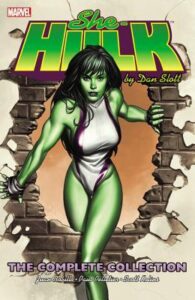 She-Hulk: The Complete Collection Vol 1, Dan Slott, Juan Bobillo, Paul Pelletier, Scott Kolins
She-Hulk: The Complete Collection Vol 1, Dan Slott, Juan Bobillo, Paul Pelletier, Scott Kolins
It took me a while to get round to reading this, especially since the opening few pages feature what read very much like shaming Jennifer/She-Hulk for her sexuality. It makes some sense — she is partying hard and putting the other Avengers at risk (or at the very least inconveniencing them), and taking her status as an Avenger for granted. It also leads into a whole thread about her double identity, and what might be the advantage of being Jennifer Walters. (For those who don’t know, unlike her cousin, Bruce Banner, she has more control over her transformations, and spends a lot of time as She-Hulk.)
There’s also some wacky hijinks and fun plots involving law, since Jennifer Walters is a lawyer. I liked the art and colours, too, so I’m somewhat surprised now to be writing the review and not knowing quite what to say. It’s entertaining, and I enjoyed this version of the character, but I did start to feel like maybe it needed some fresh blood — and this is only the first collection! There’s another Dan Slott collection as well. Hmmm…
I asked for volume two for Christmas, so here’s hoping it stays lively and fun.
Rating: 3/5
Tags: book reviews, books, comics, Marvel
Posted December 6, 2016 by Nicky in Reviews / 4 Comments
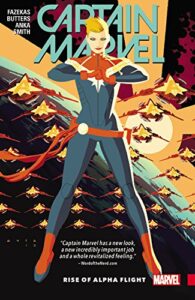 Captain Marvel: Rise of Alpha Flight, Tara Butters, Michele Fazekas, Kris Anka, Tara Guggenheim, Felipe Smith
Captain Marvel: Rise of Alpha Flight, Tara Butters, Michele Fazekas, Kris Anka, Tara Guggenheim, Felipe Smith
I was a pretty unsure what to expect with this one — my first Captain Marvel comic without Kelly Sue DeConnick at the helm. To make it worse, I don’t know anything about Alpha Flight, so I was bombarded with a bunch of new characters; I don’t even know if they appeared elsewhere before? It’s times like this I feel like being a Marvel fan only since 2012ish lets me down: I don’t even know whether to cheer or groan, half the time.
(Civil War 2? Groan. If the solo Captain Marvel comics delve into that too much, I’m gonna hate it. The first one had some powerful storytelling, but twisted the characters to get them into a deadlock against each other. I can’t see a second run at it doing much good, and I don’t want to see Captain Marvel going it against the Marvel universe Tony Stark style. I can’t even remember which side Carol was on in the original Civil War.)
Anyway, Butters and crew are reasonably competent, taking us through a pretty usual story for Carol where she punches things, her phenomenal powers are damped down by something, she punches things some more, and then has to practice the joy of diplomacy. Somehow, everything turns out okay. Maybe I’m just describing all superhero comics; maybe I’m getting a bit cynical. While there were bits of this which felt good — Rhodey’s warnings to Carol, the appearance of Rocket — overall I wasn’t madly enthused. It’s fun while I’m reading it, and I’m willing to try some more, but I feel like the first few DeConnick books worked for me in a way this didn’t. (Though it is, at least, an improvement over Captain Marvel and the Carol Corps.) There’s something unmemorable about it, which probably explains why the only characters I can name without the book on hand are Rhodey, Carol and Rocket.
Rating: 3/5
Tags: book reviews, books, comics, Marvel
Posted December 4, 2016 by Nicky in Reviews / 0 Comments
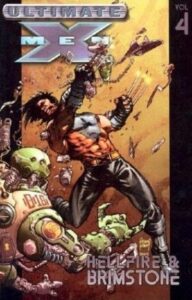 Ultimate X-Men: Hellfire and Brimstone, Mark Millar, Adam Kubert, Kaare Andrews
Ultimate X-Men: Hellfire and Brimstone, Mark Millar, Adam Kubert, Kaare Andrews
Isn’t Beast supposed to be really intelligent? I mean, I get that he feels isolated and stuff, but — argh, when a plot depends on someone being a total idiot, and on Professor Xavier not noticing what the hell’s going on with that even though he’s a telepath and we know from volume two that he wiped Bobby Drake and his girlfriend’s mind because they were a security risk?
Nope, back to two stars goes this series. It doesn’t help that the tension between Wolverine and Cyclops is just eyeroll worthy. More macho than thou and so on, fighting over Jean Grey, who… makes it pretty damn clear she loves Cyclops and was always interested in him. (Which does have some cute bits in this volume, actually, and it does help Cyclops unbend a little.)
The Jean Grey/Phoenix plotline seems a bit thrown away, considering that I know it’s a Big Thing in other versions of the X-Men. I assume it’ll recur in later volumes or something, but I don’t think I’m going to read any more of Ultimate X-Men now I’ve finished the volumes I had. Which is a shame, since Kitty Pryde just got introduced, and I did enjoy her in Ultimate Spider-man, but… this doesn’t have the same feel at all. It probably doesn’t help that it’s a team book, so there’s less time to focus on a particular character.
Rating: 2/5
Tags: book reviews, books, comics, Marvel
Posted November 26, 2016 by Nicky in Reviews / 0 Comments
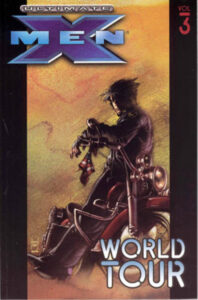 Ultimate X-Men: World Tour, Mark Millar, Adam Kubert, Chris Bachalo
Ultimate X-Men: World Tour, Mark Millar, Adam Kubert, Chris Bachalo
This is an improvement on the two previous volumes, where I actually got somewhat more involved in the story. Not so much Colossus’ story, which kind of seemed out of the blue to me — he seemed pretty engaged with the X-Men and Xavier’s plan, and suddenly he… wants to go off and have a normal life, and he’s not sure about the goals of the X-Men?
But the story with Xavier’s son has genuine feeling and character development, mostly for Xavier. It takes him being the wise mentor to being a guy who can really fuck up on his own account, too. I wish he wasn’t quite so all-knowing at times, but I guess that’s the problem with your character being a telepath.
I’m not so sure about the Gambit storyline; I recall enjoying the character in an animated series or something, but how he’s supposed to be getting by in a world that hates mutants while so blatantly displaying his abilities, I don’t know. And I know the whole Cajun background is an important part of Gambit, but man, is his dialogue ever difficult to parse. That whole section isn’t much connected to the rest of the book, either…
Still, more enjoyable than the first two volumes, I think.
Rating: 3/5
Tags: book reviews, books, comics, Marvel
Posted November 21, 2016 by Nicky in Reviews / 0 Comments
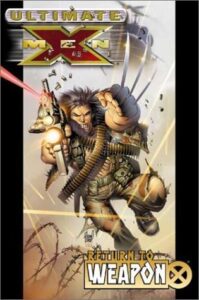 X-Men: Return to Weapon X, Mark Millar, Adam Kubert
X-Men: Return to Weapon X, Mark Millar, Adam Kubert
I am still not sold on this — and Sabretooth is just a Wolverine knock-off, so I don’t think there’s a single scrap of tension in the scenes with him. Actually, in general the blurbs on the backs of these don’t quite seem to match the reality. Logan doesn’t “go it alone against the shadow-ops organisation that transformed him into one of the world’s most lethal killing machines”, and Sabretooth is not “a predator every bit [Wolverine’s] equal”.
I remember liking Rogue in some TV series or other, but there’s not much to get hold of here. And ugh, that phonetic accent. But Nightcrawler’s kind of cool.
So yeah, still not sold on this, and will someone tell the artist that breasts just don’t look like that? Like, they’re not shiny globes with one point of attachment to the female body. In some of these panels, it just looks like Jean and Ororo are holding pairs of melons in front of them via Jean’s telekinesis.
Rating: 2/5
Tags: book reviews, books, comics, Marvel
Posted November 16, 2016 by Nicky in Reviews / 0 Comments
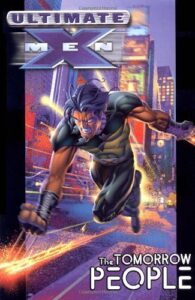 Ultimate X-Men: The Tomorrow People, Mark Millar, Adam Kubert
Ultimate X-Men: The Tomorrow People, Mark Millar, Adam Kubert
After enjoying the Ultimate Spider-man books, I was pretty hopeful about Ultimate X-Men — especially since I remember enjoying the appearances of the various X-Men in the Spider-man comics. I enjoyed X-Men cartoons a lot as a kid, and it seems to me a shame that — as with Batman and Superman, actually — I haven’t particularly enjoyed the comics. Unfortunately, The Tomorrow People didn’t change that much.
It might not help that it’s a team book, so we don’t see one individual character for long, and it definitely doesn’t help that they’re teenagers and that Scott Summers accordingly has a tantrum. A tantrum that has entirely predictable results, of course. Meanwhile, Wolverine switches sides, more or less for no apparent reason. Quicksilver and Scarlet Witch do so as well, with comparatively little background. And Magneto is entirely too easy to take down — obviously this isn’t going to be the last the X-Men see of him in this series, because it’s Magneto, but.
It felt like a lot of flash and not much bang, really. I own three more volumes, so I will read them. After that… I don’t know. Not on the strength of this volume.
Rating: 2/5
Tags: book reviews, books, comics
Posted October 15, 2016 by Nicky in Reviews / 0 Comments
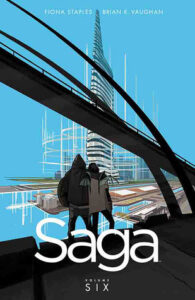 Saga: Volume Six, Fiona Staples, Brian K. Vaughan
Saga: Volume Six, Fiona Staples, Brian K. Vaughan
As always, the art is gorgeous: I don’t think I could stand to see anyone else illustrate these books. Fiona Staples has everything just right: the expressions, the sense of movement, composition of the panels and pages… Sometimes she can make me laugh by just illustrating the perfect expression or moment.
This volume is as enjoyable as the rest, and it has big emotional payoff — finally, Marko, Alana and Hazel are reunited, Klara has found a place in the world, Hazel’s old enough to start doing some saving of herself instead of just waiting for her parents… There’s some aspects which felt more like filler, like the journalists and the Will’s weird drug-addicted, Lying Cat-less life, and there are a couple of new characters who we might see quite a bit more of, but who for now don’t carry much weight. But mostly, it was a hugely satisfying volume for me, and I can’t wait for more. Particularly with that last scene…
Rating: 4/5
Tags: book reviews, books, comics
Posted October 9, 2016 by Nicky in Reviews / 2 Comments
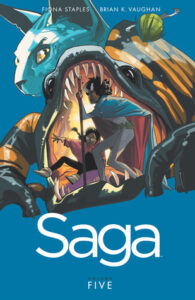 Saga Volume 5, Brian K. Vaughan, Fiona Staples
Saga Volume 5, Brian K. Vaughan, Fiona Staples
If you’re a fan of Saga already, then this is probably as much up your street as the other volumes — funny, wise, gross, heartbreaking, and beautifully drawn. To my mind, it suffers somewhat because Marko and Alana aren’t together, and Marko’s storyline here seems to mostly be about moving him from A to B so he’s in the right place at the right time (and in the right frame of mind). I’m not a huge fan of the Will’s storyline, usually, but I do enjoy Sophie and the Brand’s interactions — even if the whole storyline about trying to cure the Will is a bit meh, given I couldn’t care less.
It’s not the strongest volume, I think, but I did enjoy Klara’s badassness, and as usual it’s gorgeous. And I’m very relieved that it doesn’t linger over the story too much, instead jumping ahead when the narrative is ready.
Rating: 4/5
Tags: book reviews, books, comics, SF/F
Posted October 2, 2016 by Nicky in Reviews / 0 Comments
 Captain Marvel and the Carol Corps, Kelly Sue DeConnick, Kelly Thompson, David Lopez, Laura Braga
Captain Marvel and the Carol Corps, Kelly Sue DeConnick, Kelly Thompson, David Lopez, Laura Braga
This is… actually quite a disappointing volume. I mean, okay, the Banshees (or Carol Corps) are pretty badass, of course, but it’s a tie-in to Secret Wars? I think? And it’s really not clear what the background is. I don’t read most event comics, and when I do it’s just for the characters I love and follow. Sometimes a skilled writer manages to keep things comprehensible, and sometimes not — for a Captain Marvel fan, most of this makes no sense… and has no impact on the character. It’s not clear what the significance of any of it is.
To add to that feeling of it being a rip-off, there’s four issues here which are new… and the final issue is Captain Marvel #17, which I already own, in context, in the proper TPB. Here it’s completely random and doesn’t continue or add to the story of the Carol Corps arc at all. Worse, it’s the Felipe Andrade art — so it looks (to me anyway) absolutely terrible.
I do love Kelly Sue’s take on Captain Marvel in general, but… skip this one.
Rating: 1/5
Tags: book reviews, books, comics, Kelly Sue DeConnick, Marvel









